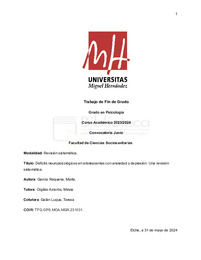Please use this identifier to cite or link to this item:
https://hdl.handle.net/11000/32672Full metadata record
| DC Field | Value | Language |
|---|---|---|
| dc.contributor.advisor | Orgilés, Mireia | - |
| dc.contributor.advisor | Galán-Luque, Teresa | - |
| dc.contributor.author | García Requena, Marta | - |
| dc.contributor.other | Departamentos de la UMH::Psicología de la Salud | es_ES |
| dc.date.accessioned | 2024-07-24T08:31:05Z | - |
| dc.date.available | 2024-07-24T08:31:05Z | - |
| dc.date.created | 2024-06 | - |
| dc.identifier.uri | https://hdl.handle.net/11000/32672 | - |
| dc.description.abstract | Los trastornos psicológicos en adolescentes están comúnmente relacionados con déficits a nivel cognitivo. Especialmente, la ansiedad y depresión se encuentran entre los problemas más comunes que experimenta la población infanto-juvenil. La literatura científica busca esclarecer cómo difieren los jóvenes con diversa sintomatología respecto a la población carente de síntomas en diversas áreas del funcionamiento neuropsicológico. Recientemente, el foco de interés ha hecho mayor hincapié en los déficits de las funciones cognitivas y es así como diversas líneas de investigación se han encargado de establecer los vínculos entre las funciones cognitivas y los problemas emocionales. La presente revisión sistemática se llevó a cabo siguiendo el método PRISMA y utilizando un enfoque de identificación, análisis y síntesis de resultados relevantes de publicaciones científicas. Las bases de datos consultadas fueron ApaPsycINFO, ERIC, Web of Science, Medline y Scopus, obteniéndose finalmente un total de 18 artículos que cumplían con los criterios de inclusión. Los estudios incluidos mayoritariamente revelan correlaciones significativas entre el grupo experimental y un deterioro en las funciones cognitivas, en comparación con muestras sin sintomatología. No obstante, se recomienda un mayor estudio para futuras líneas de investigación con muestras más homogéneas y un rango de edad más reducido. | es_ES |
| dc.description.abstract | Psychological disorders in adolescents are commonly related to cognitive deficits. Especially, anxiety and depression are among the most common problems experienced by the child and adolescent population .The scientific literature seeks to clarify how children with diverse symptoms differ from the population without symptoms in various areas of neuropsychological functioning. Recently, the focus of interest has placed greater emphasison deficits in cognitive functions and this is how various lines of research have been responsible for establishing the links between cognitive functions and emotional problems. The present systematic review was carried out following the PRISMA method and using an approach of identification, analysis and synthesis of relevant results from scientific publications. The databases consulted were ApaPsycINFO, ERIC, Web of Science, Medlinen and Scopus, finally obtaining a total of 18 articles that met the inclusion criteria. Most of the included studies reveal significant correlations between the experimental group and an impairment in cognitive functions, compared to the group without any kind of symptoms. However, further study is recommended for future research lines with more homogeneous samples and a narrower age range. | es_ES |
| dc.format | application/pdf | es_ES |
| dc.format.extent | 31 | es_ES |
| dc.language.iso | spa | es_ES |
| dc.publisher | Universidad Miguel Hernández de Elche | es_ES |
| dc.rights | info:eu-repo/semantics/openAccess | es_ES |
| dc.rights.uri | http://creativecommons.org/licenses/by-nc-nd/4.0/ | * |
| dc.subject | problemas emocionales | es_ES |
| dc.subject | síntomas internalizantes | es_ES |
| dc.subject | adolescentes | es_ES |
| dc.subject | funciones cognitivas | es_ES |
| dc.subject | revisión sistemática | es_ES |
| dc.subject | emotional problems | es_ES |
| dc.subject | internalizing symptoms | es_ES |
| dc.subject | adolescents | es_ES |
| dc.subject | cognitive functions | es_ES |
| dc.subject | systematic review | es_ES |
| dc.subject.other | CDU::1 - Filosofía y psicología::159.9 - Psicología | es_ES |
| dc.title | Déficits neuropsicológicos en adolescentes con ansiedad y depresión: Una revisión sistemática | es_ES |
| dc.type | info:eu-repo/semantics/bachelorThesis | es_ES |

View/Open:
TFG MARTA GARCÍA.pdf
801,39 kB
Adobe PDF
Share:
Admin Tools
.png)
